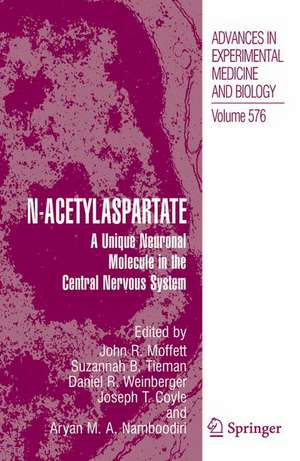N-Acetylaspartate: A Unique Neuronal Molecule in the Central Nervous System: Advances in Experimental Medicine and Biology, cartea 576
Editat de John Moffett, Suzannah B. Tieman, Daniel R. Weinberger, Joseph T. Coyle, Aryan M. A. Namboodirien Limba Engleză Hardback – 28 mar 2006
First, the acetyl proton on NAA gives off a very prominent signal in water-suppressed, proton magnetic resonance spectroscopy (MRS), which permits clinicians to monitor levels of NAA in the brains of patients in a non-invasive manner. Because NAA is found primarily in neurons, and because the levels in the brain have been found to change rapidly after injury, or slowly during neurodegenerative diseases, MRS has become a preferred method of analyzing nerve cell dysfunction and death without surgical intervention.
The second reason that NAA has attracted attention in recent years is that a congenital genetic disorder of NAA metabolism has been found to be the cause of the neurodegenerative disorder known as Canavan’s disease. Canavan’s disease is an inherited leukodystrophy that involves myelination pathologies of cortical white matter, leading to death within 10 years of birth. The genetic mutation results in a defective enzyme that de-acetylates NAA in the brain, resulting in a significant rise in NAA levels in the brain and urine. This enzyme, known as aspartoacylase (ASPA), appears to be involved in the process of myelination, such that a defective enzyme results in a disruption of the myelination of nerve fibers during development.
The purpose of this symposium is to bring together investigators from around the world who are interested in the study of NAA, and the roles it plays in neuronaldevelopment and functioning. It is hoped that bringing researchers and clinicians together in such a forum will facilitate rapid progress in this emerging field, and will help lead to discoveries that can alleviate the suffering caused by a deadly, inheritable infantile disease.
| Toate formatele și edițiile | Preț | Express |
|---|---|---|
| Paperback (1) | 1276.15 lei 6-8 săpt. | |
| Springer Us – 25 noi 2014 | 1276.15 lei 6-8 săpt. | |
| Hardback (1) | 1225.94 lei 6-8 săpt. | |
| Springer Us – 28 mar 2006 | 1225.94 lei 6-8 săpt. |
Din seria Advances in Experimental Medicine and Biology
- 9%
 Preț: 719.56 lei
Preț: 719.56 lei - 5%
 Preț: 717.00 lei
Preț: 717.00 lei - 5%
 Preț: 717.00 lei
Preț: 717.00 lei - 15%
 Preț: 640.24 lei
Preț: 640.24 lei - 5%
 Preț: 715.71 lei
Preț: 715.71 lei - 5%
 Preț: 716.28 lei
Preț: 716.28 lei - 20%
 Preț: 691.93 lei
Preț: 691.93 lei - 5%
 Preț: 1031.00 lei
Preț: 1031.00 lei - 5%
 Preț: 820.42 lei
Preț: 820.42 lei - 5%
 Preț: 716.28 lei
Preț: 716.28 lei - 15%
 Preț: 641.38 lei
Preț: 641.38 lei - 5%
 Preț: 717.20 lei
Preț: 717.20 lei - 5%
 Preț: 715.35 lei
Preț: 715.35 lei - 5%
 Preț: 1113.83 lei
Preț: 1113.83 lei - 20%
 Preț: 1161.71 lei
Preț: 1161.71 lei - 5%
 Preț: 1170.51 lei
Preț: 1170.51 lei - 18%
 Preț: 1119.87 lei
Preț: 1119.87 lei - 5%
 Preț: 1288.48 lei
Preț: 1288.48 lei - 5%
 Preț: 1164.67 lei
Preț: 1164.67 lei - 5%
 Preț: 1101.73 lei
Preț: 1101.73 lei - 18%
 Preț: 1123.67 lei
Preț: 1123.67 lei - 5%
 Preț: 1435.64 lei
Preț: 1435.64 lei - 20%
 Preț: 1044.10 lei
Preț: 1044.10 lei - 18%
 Preț: 946.39 lei
Preț: 946.39 lei - 5%
 Preț: 292.57 lei
Preț: 292.57 lei - 18%
 Preț: 957.62 lei
Preț: 957.62 lei - 18%
 Preț: 1235.76 lei
Preț: 1235.76 lei - 5%
 Preț: 1231.55 lei
Preț: 1231.55 lei - 5%
 Preț: 1292.30 lei
Preț: 1292.30 lei - 5%
 Preț: 1102.10 lei
Preț: 1102.10 lei - 18%
 Preț: 1132.81 lei
Preț: 1132.81 lei - 5%
 Preț: 1165.19 lei
Preț: 1165.19 lei - 5%
 Preț: 1418.48 lei
Preț: 1418.48 lei - 5%
 Preț: 1305.63 lei
Preț: 1305.63 lei - 18%
 Preț: 1417.72 lei
Preț: 1417.72 lei - 18%
 Preț: 1412.99 lei
Preț: 1412.99 lei - 24%
 Preț: 806.15 lei
Preț: 806.15 lei - 18%
 Preț: 1243.29 lei
Preț: 1243.29 lei - 5%
 Preț: 1429.44 lei
Preț: 1429.44 lei - 5%
 Preț: 1618.70 lei
Preț: 1618.70 lei - 5%
 Preț: 1305.12 lei
Preț: 1305.12 lei - 18%
 Preț: 1124.92 lei
Preț: 1124.92 lei - 5%
 Preț: 1097.54 lei
Preț: 1097.54 lei - 15%
 Preț: 649.87 lei
Preț: 649.87 lei - 5%
 Preț: 1097.54 lei
Preț: 1097.54 lei - 18%
 Preț: 945.79 lei
Preț: 945.79 lei - 5%
 Preț: 1123.13 lei
Preț: 1123.13 lei - 20%
 Preț: 816.43 lei
Preț: 816.43 lei
Preț: 1225.94 lei
Preț vechi: 1495.04 lei
-18% Nou
Puncte Express: 1839
Preț estimativ în valută:
234.58€ • 244.44$ • 194.23£
234.58€ • 244.44$ • 194.23£
Carte tipărită la comandă
Livrare economică 03-17 aprilie
Preluare comenzi: 021 569.72.76
Specificații
ISBN-13: 9780387301716
ISBN-10: 0387301712
Pagini: 375
Ilustrații: XVII, 375 p.
Dimensiuni: 155 x 235 x 25 mm
Greutate: 0.68 kg
Ediția:2006
Editura: Springer Us
Colecția Springer
Seria Advances in Experimental Medicine and Biology
Locul publicării:New York, NY, United States
ISBN-10: 0387301712
Pagini: 375
Ilustrații: XVII, 375 p.
Dimensiuni: 155 x 235 x 25 mm
Greutate: 0.68 kg
Ediția:2006
Editura: Springer Us
Colecția Springer
Seria Advances in Experimental Medicine and Biology
Locul publicării:New York, NY, United States
Public țintă
Academic/professional/technical: Undergraduate. Academic/professional/technical: Postgraduate. Academic/professional/technical: Research and professionalCuprins
A Brief Overview of N-Acetylaspartate and N-Acetylaspartylglutamate.- Expression of N-Acetylaspartate and N-Acetylaspartylglutamate in the Nervous System.- N-Acetylaspartate Metabolism in Neural Cells.- Naa Synthesis and Functional Roles.- Identity of the High-Affinity Sodium/Carboxylate Cotransporter NaC3 as the N-Acetyl-L-Aspartate Transporter.- Canavan Disease: Studies on the Knockout Mouse.- Functions Of N-Acetylaspartate and N-Acetylaspartylglutamate in Brain.- Control of Brain Volume during Hypoosmolality and Hyperosmolality.- Physiological Role of N-Acetylaspartate.- Defective Myelin Lipid Synthesis as a Pathogenic Mechanism of Canavan Disease.- Mutation Analysis of the Aspartoacylase Gene in Non-Jewish Patients with Canavan Disease.- Does ASPA Gene Mutation in Canavan Disease Alter Oligodendrocyte Development?.- Quantitation of NAA in the Brain by Magnetic Resonance Spectroscopy.- N-Acetyl-L-Aspartate in Multiple Sclerosis.- NAA and Higher Cognitive Function in Humans.- In Vivo NMR Measures of NAA and the Neurobiology of Schizophrenia.- N-Acetylaspartate as a Marker of Neuronal Injury in Neurodegenerative Disease.- Regulation of NAA-Synthesis in the Human Brain in Vivo: Canavan’s Disease, Alzheimer’s Disease and Schizophrenia.- Magnetic Resonance Spectroscopy for Monitoring Neuronal Integrity in Amyotrophic Lateral Sclerosis.- Hypoacetylaspartia: Clinical and Biochemical Follow-Up of a Patient.- Cellular Localization of NAAG.- Synthesis of N-Acetylaspartylglutamate (NAAG) and N-Acetylaspartate (NAA) in Axons and Glia of the Crayfish Medial Giant Nerve Fiber.- NAAG as a Neurotransmitter.- Glutamate Carboxypeptidase II (NAALADase) Inhibition as a Novel Therapeutic Strategy.- N-Acetylaspartylglutamate (NAAG) in Spinal Cord Injury and Disease.-N-Acetylaspartylglutamate (NAAG) in Pelizaeusmerzbacher Disease.- Concluding Remarks.
Caracteristici
Covers topics that both researchers and clinicians have interest in Includes supplementary material: sn.pub/extras











